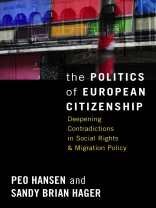As the European Union faces the ongoing challenges of legitimacy, identity, and social cohesion, an understanding of the social purpose and direction of EU citizenship becomes increasingly vital. This book is the first of its kind to map the development of EU citizenship and its relation to various localities of EU governance. From a critical political economy perspective, the authors argue for an integrated analysis of EU citizenship, one that considers the interrelated processes of migration, economic transformation, and social change and the challenges they present.
Зміст
Preface
Abbreviations
Introduction: European Integration and the Problem of Citizenship
PART I: THEORY AND HISTORY OF EU CITIZENSHIP
Chapter 1. Theorizing Citizenship in the EU: Towards a Critical History
Chapter 2. The Origins of EU Citizenship (1950–1980)
Chapter 3. A Citizens’ Europe for Whom? Social Citizenship, Migration, and the Neoliberal Relaunch of European Integration (1980–1995)
PART II: THE CURRENT TRAJECTORIES OF CITIZENSHIP POLITICS IN THE EU
Chapter 4. “No Rights Without Responsibilities”: Adapting Citizens for the New European Economy
Chapter 5. A New EU Politics of Migration, a New Politics of EU Citizenship? Analyzing the Amsterdam Treaty and Tampere Program
Chapter 6. “At the Heart of Citizens’ Interests”: EU Migration Policy in the Hague Program
Conclusion: The Politics of European Citizenship: Power Asymmetries, Contradictions, and Trajectories
Afterword (Paperback Edition)
References
Index
Про автора
Sandy Brian Hager is a Ph D candidate in the Department of Political Science at York University, Toronto. His research interests and publications have focused on the political economy of welfare restructuring in the European Union, and more recently, on capital theory, global finance, and geopolitics.












